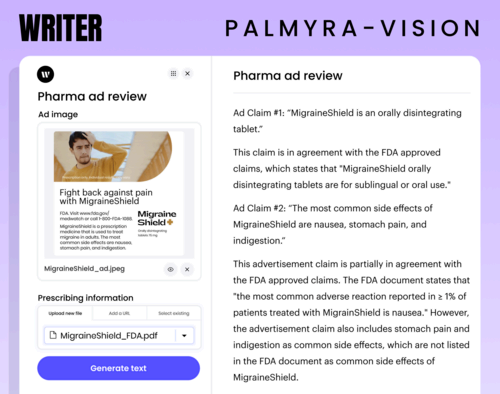Writer, a leading enterprise AI startup, announced today the launch of a new multimodal AI model that can analyze and integrate visual data with text.
The model, called Palmyra-Vision, is designed to help businesses streamline complex workflows that involve images, charts, graphs, and other visual inputs, as well as natural language understanding.
May Habib, the chief executive and co-founder of Writer, said in an interview with VentureBeat that Palmyra-Vision was the result of a vision to rethink entire workflows with multimodal AI capabilities.
“We realized that in many industries, companies have the opportunity to take a macro view and rethink entire workflows with multimodal AI capabilities,” Habib said. “Our goal with Palmyra-Vision was to build a versatile model optimized for real enterprise use cases.”
VB Event
The AI Impact Tour – NYC
We’ll be in New York on February 29 in partnership with Microsoft to discuss how to balance risks and rewards of AI applications. Request an invite to the exclusive event below.

A breakthrough in multimodal AI
According to Habib, the model can extract insights from images, classify objects, interpret charts and graphs, answer specific questions, and generate text descriptions. On several benchmark tests, Palmyra-Vision achieved state-of-the-art accuracy, outperforming other lauded multimodal models like OpenAI’s GPT-4V and Google’s Gemini 1.0 Ultra.
Unlike other models, Writer has focused on tailoring Palmyra-Vision’s capabilities for practical business applications across sectors like retail, marketing, healthcare, finance, and more.
“In work, when you need a chart interpreted, or you need to write ad copy for an image, the consumer models just aren’t cutting it,” Habib told VentureBeat. “We built Palmyra-Vision from the ground up for enterprise needs.”
Quick integration with Writer’s full-stack platform
What sets Palmyra-Vision apart is how easily it integrates with Writer’s full-stack AI platform, which includes large language models, a graph-based knowledge retrieval system, and robust data guardrails.
“The enterprise is getting model fatigue,” said Habib. “People want AI solutions, not more models.”
“Palmyra-Vision is baked into our platform, so anyone can build custom multimodal apps without engineering resources,” she added.
This means Writer customers can quickly build tailored AI solutions combining structured data, unstructured text, and visual inputs. For instance, a healthcare firm could analyze doctor’s handwritten notes together with medical imagery and patient charts to generate insights.
According to Habib, Writer’s guardrails and accuracy focus also gives enterprises more control and safety with AI. The company does extensive bias testing and allows customers granular control over content policies.
“We don’t take a one-size-fits-all approach to guardrails,” Habib told VentureBeat. “Our customers need flexibility because they handle sensitive data.”
Investor excitement about Enterprise AI
In the three years since it was founded, Writer has raised more than $120 million from leading investors including WndrCo, Balderton Capital and Insight Partners. The company seems poised to compete with AI giants like OpenAI and Anthropic as businesses rapidly adopt next-generation AI this year.
“We’re seeing incredible excitement from investors about enterprise AI right now,” noted Habib. “Companies need purpose-built solutions that deliver value, not more general models.”
With the launch of Palmyra-Vision, Writer aims to lead that charge in enterprise AI adoption. Its versatile multimodal model, ease of integration, and focus on accuracy could give it an edge with data-driven businesses looking to reimagine workflows.
VentureBeat’s mission is to be a digital town square for technical decision-makers to gain knowledge about transformative enterprise technology and transact. Discover our Briefings.

